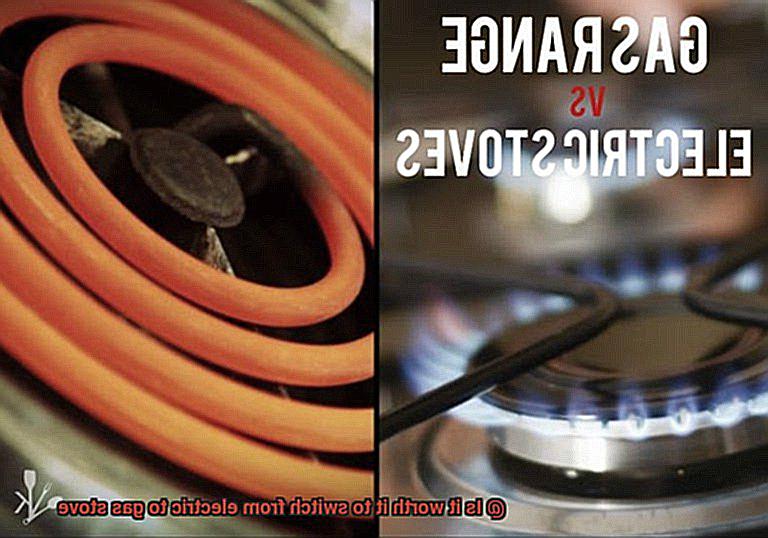Do you find yourself impatiently waiting for your electric stove to heat up? Are you tired of unevenly cooked meals? It might be time to consider switching to a gas stove. But before you make the leap, it’s important to weigh the costs and benefits.
Gas stoves offer several advantages over electric ones. With direct flame heating, they provide faster cooking times and precise temperature control, giving you more control over your culinary creations. Plus, the flame creates a cozy ambiance in your kitchen that electric stoves just can’t match.
But don’t get too starry-eyed just yet. Switching to a gas stove requires some initial investment. Installation costs are higher than for electric stoves, and proper ventilation is crucial for safety reasons. You’ll also need to make sure you’re comfortable working with gas lines and burners.
Maintenance costs are another consideration. Gas stoves require regular upkeep of their gas lines, valves, and burners, which can add up over time.
So is it worth it? That depends on your priorities. If you’re passionate about cooking and want greater control over your meals, then a gas stove might be worth the investment. But if cost is a major concern or if you’re not comfortable with the added maintenance and safety considerations, then sticking with an electric stove might be the better option.
In this blog post, we’ll delve into the pros and cons of switching from electric to gas so that you can make an informed decision about what’s best for your kitchen and budget. So whether you’re a seasoned home cook or just looking to upgrade your appliances, keep reading.
Contents
Advantages of a Gas Stove
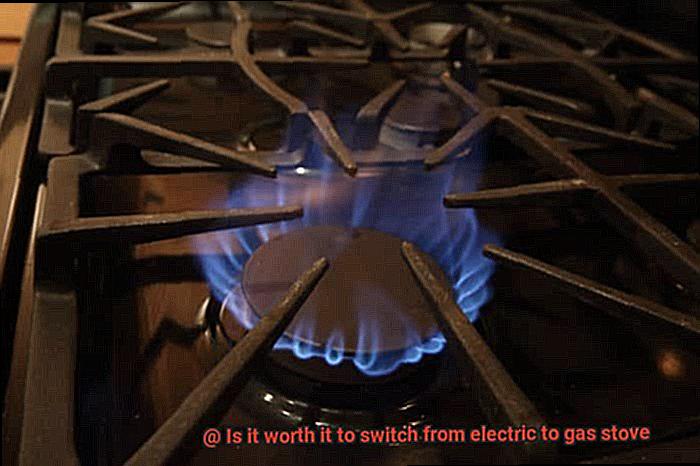
If you’re looking for a stove that can make your cooking experience faster and more efficient, then a gas stove might be the perfect choice for you. Not only do they heat up much faster than electric stoves, but they also offer greater temperature control, instant heat adjustments, and can even be used during power outages. Here are some of the advantages of having a gas stove in your kitchen:
- Faster Heating Times: Gas stoves are known for their ability to heat up quickly, making them ideal for those who are pressed for time. With an open flame that can heat pots and pans more quickly than the heating elements on an electric stove, cooking with gas can save you valuable time when preparing meals.
- Greater Temperature Control: One of the biggest advantages of gas stoves is their level of temperature control. With a gas stove, you can easily adjust the flame to get exactly the right temperature for your cooking needs. This is especially important when cooking dishes that require precise temperatures, such as soufflés or custards.
- Instant Heat Adjustments: Gas stoves provide instant heat adjustments, which means that you can easily adjust the temperature mid-cooking if needed. This is in contrast to electric stoves which can take some time for the heating element to adjust to a new temperature setting.
- Can be Used During Power Outages: In case of an emergency or power outage, gas stoves can still be used whereas electric stoves cannot. This makes them an important appliance to have if you live in an area that experiences frequent power outages or if you rely on your stove for cooking during emergency situations.
- Durability: Gas stoves are generally more durable than electric stoves since the burners are less likely to become damaged over time. This means that they will last longer and require less maintenance.
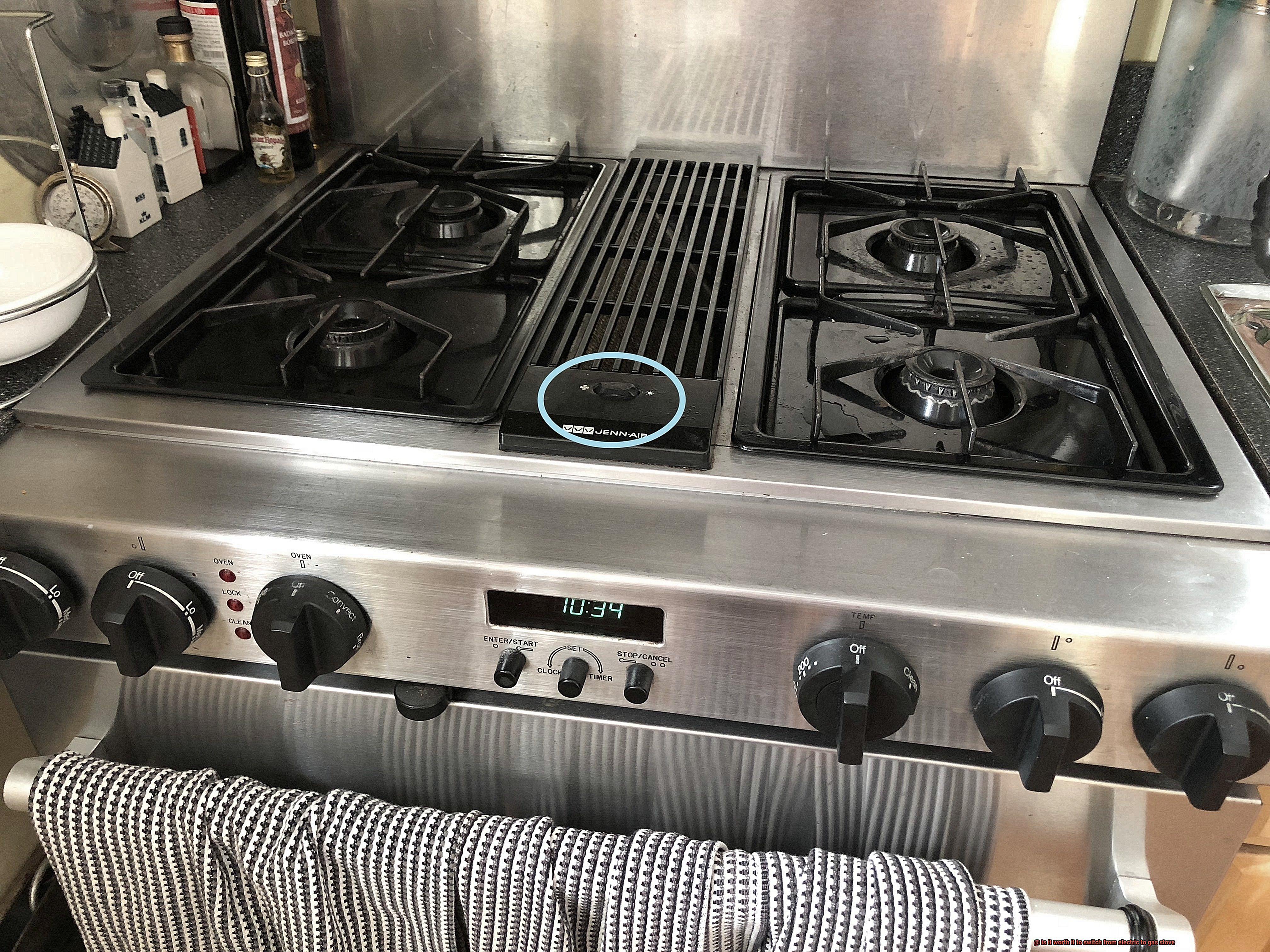
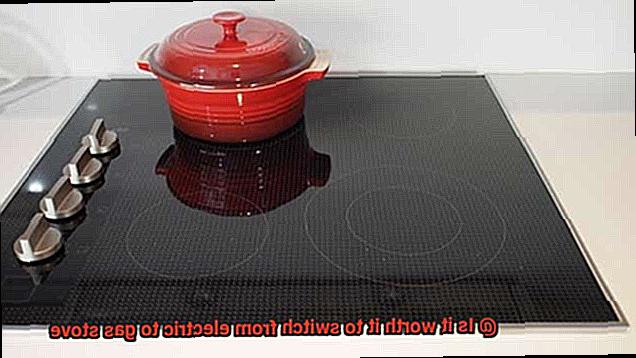
Precise Temperature Control
Upgrade to a gas stove and take your cooking game to the next level. As an expert in this field, I can assure you that a gas stove is the way to go if you want to achieve perfect cooking results every time.
Firstly, gas stoves allow you to adjust the flame to precisely control the temperature of your cookware and food. This means that you can cook your meals exactly how you want them without worrying about overcooking or undercooking. Unlike electric stoves, which rely on slow heating elements that take time to heat up and cool down, gas stoves offer instant and precise temperature control. Whether you’re searing a steak or simmering a sauce, a gas stove makes it easy to achieve the exact temperature needed for perfect results.
Not only do gas stoves offer precise temperature control, but they also provide instant heat adjustments. With an electric stove, changing the temperature takes time as you have to wait for the heating element to cool down before making any changes. But with a gas stove, you can quickly adjust the flame to prevent burning or undercooking your food. For example, when sautéing vegetables, you can simply lower the flame to prevent them from burning.
Another advantage of gas stoves is their consistent heat distribution. Unlike electric stoves, which often have hot spots or uneven heating due to their heating elements’ design, gas stoves provide even heat throughout the cooking surface. This ensures that your food is cooked evenly every time, without burnt or undercooked spots.
Faster Heating Time

Well, switching to a gas stove can solve all your culinary woes, especially when it comes to faster heating time.
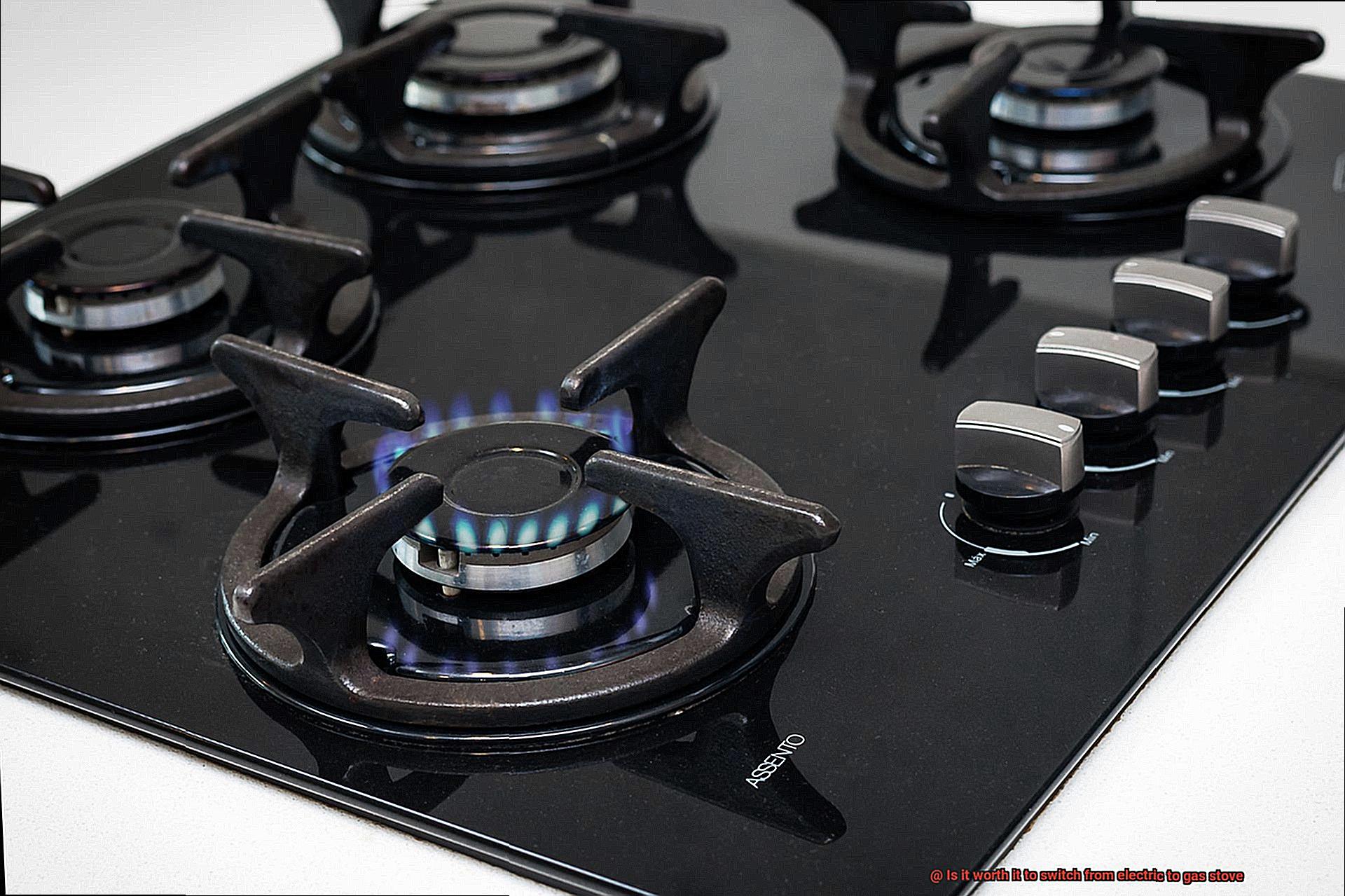
Gas stoves provide instant heat, allowing you to cook meals in a fraction of the time it would take with an electric stove. The gas flame heats up quickly and allows you to adjust the temperature instantly, giving you more control over your cooking. No more waiting for that pesky heating element to warm up; with gas stoves, you’ll have quick and easy access to precise temperature control.
In contrast, electric stoves take time to heat up and cool down, which can result in longer cooking times and uneven heating. This can be frustrating, especially when you are trying to cook multiple dishes at once or need to get dinner on the table quickly.
But with a gas stove, not only will you have faster heating time, but also the added benefit of being able to sear and char food. The high heat of the gas flame creates a crispy exterior on meats and vegetables while still keeping them moist inside. This cooking technique is difficult to achieve with an electric stove.
Additionally, gas stoves are more energy-efficient than electric stoves. Gas is generally less expensive than electricity, so you will save money on your energy bills over time. And because gas stoves heat up quickly and allow you to cook your meals faster, you will use less energy overall.
Disadvantages of a Gas Stove
When it comes to cooking appliances, gas stoves have long been a popular choice for chefs and home cooks alike. However, it’s important to keep in mind the potential disadvantages of a gas stove before making the switch from an electric stove.
One of the primary drawbacks of a gas stove is the cost. Not only are gas stoves more expensive to purchase, but they also require a gas line to be installed in your home, which can be both costly and time-consuming. You’ll need to weigh this extra expense against the benefits of a gas stove.
Another disadvantage of gas stoves is the increased risk of fire or explosion. While gas stoves provide instant heat, they also use an open flame to heat the cooking surface, which can pose a danger if not used properly. Gas leaks can also occur, which can be dangerous and even deadly without proper precautions.
Cleaning a gas stove can also be more challenging than cleaning an electric stove. The grates and burners on a gas stove can easily become caked with grease and food particles, which can be tough to remove. Spills on the cooking surface can cause flare-ups and smoke, making cleanup even more difficult.
Finally, gas stoves may not be as energy-efficient as electric stoves. While they do offer precise temperature control and quick heating, they can lose heat quickly when the flame is turned off. This means you may need to use more energy to keep your food warm or reheat it later.
Higher Cost
You may be considering a switch to a gas stove. However, one of the most significant factors to consider is the higher cost.
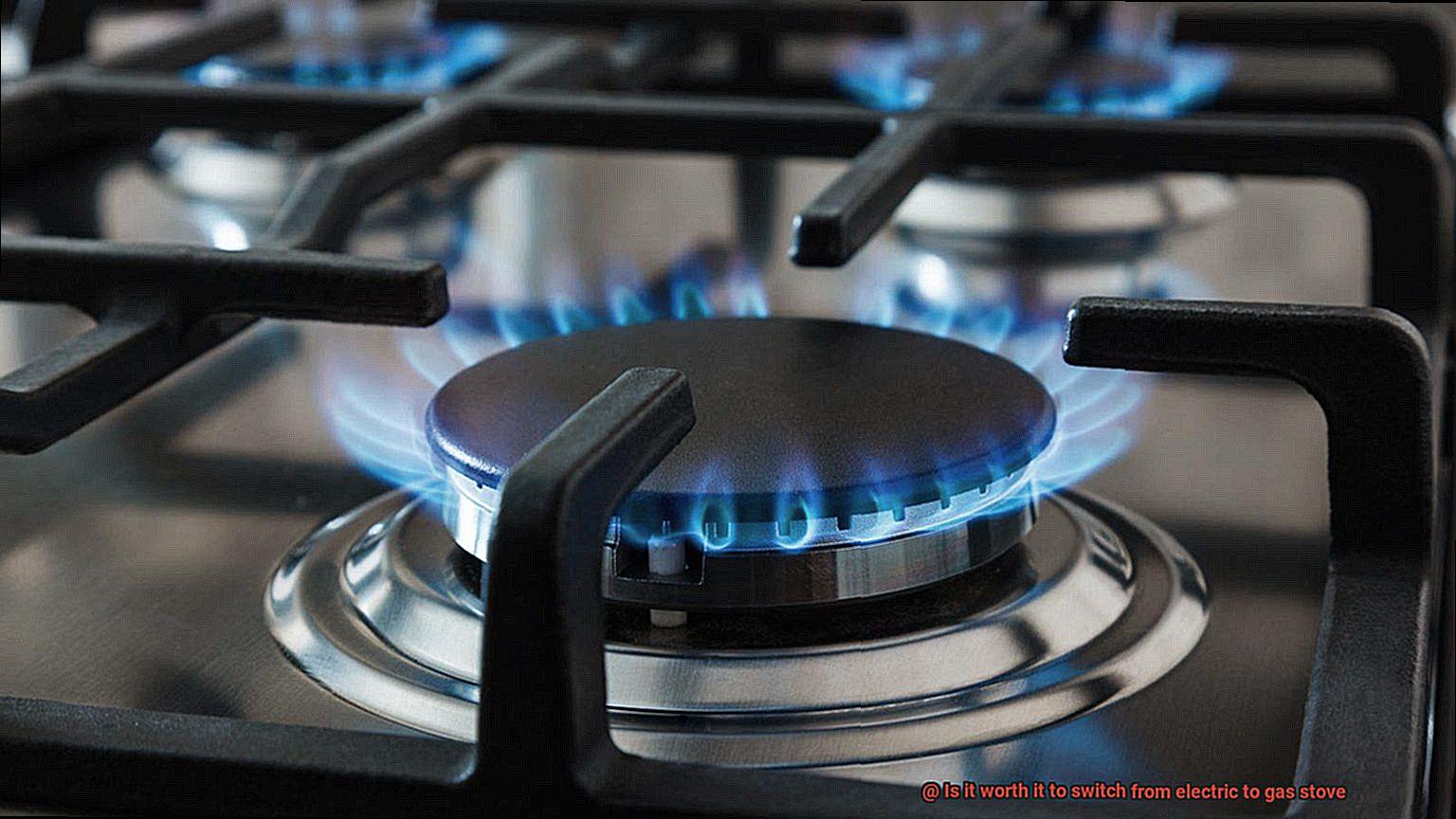
Gas stoves can be more expensive upfront due to the need for a gas line installation. But don’t let that discourage you just yet. The long-term savings and benefits of a gas stove outweigh the initial costs.
Gas stoves heat up faster and provide more precise temperature control, which can help save time and energy in the long run. And while natural gas may cost more than electricity on a monthly basis, it is often less expensive in many areas, making up for the operating costs.
But what about safety concerns? While gas stoves do pose a greater risk compared to electric ones, they are generally safe when installed correctly and maintained regularly. So you can enjoy the benefits of a gas stove without worrying about safety hazards.
And let’s not forget about the potential increase in home value. Many homebuyers prefer gas stoves over electric ones, so making the switch could potentially increase your home’s resale value.
Benefits of an Electric Stove
Electric stoves have been a popular choice among homeowners for decades, and for good reason. As an expert on the benefits of electric stoves, let me break down why they’re a fantastic option for any home cook.
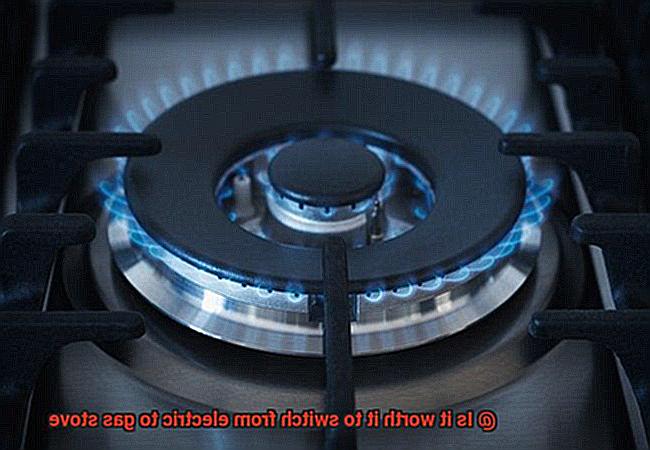
Ease of use is one of the most significant advantages of electric stoves. With just a simple turn of the dial, your electric stove heats up quickly, eliminating the need to wait for gas to come on or worry about lighting a match. This feature makes cooking with an electric stove both quick and effortless.
But what about safety? Electric stoves are much safer than gas stoves because there’s no flame involved. This makes them perfect for families with young children or pets, as there’s no risk of gas leaks or explosions. You can have peace of mind knowing that your family is safe while you cook your favorite meals.
Cleaning your stove is also a breeze with an electric stove. Unlike gas stoves, electric stoves don’t have grates or burners that need removing. All you need is a damp cloth or sponge to wipe down the surface, making cleaning up after mealtime less tedious.
On top of all these benefits, electric stoves are also energy-efficient. They lose less heat when cooking and heat up faster than gas stoves, which means you’ll save money on your energy bill while still enjoying delicious meals.
And if you’re watching your budget, electric stoves are generally less expensive than gas stoves. This means that not only will you save money on your energy bill, but you’ll also save money upfront.
Lower Cost
As you seek ways to reduce your household expenses and save time in the kitchen, switching from an electric to a gas stove could be a smart move. Trust me as an expert in the area of lower cost, and let me take you through the fascinating cost-saving benefits of gas stoves.
Firstly, gas stoves are more energy-efficient than electric stoves. They consume less energy and cost less to operate over time. Gas stoves use natural gas or propane to generate heat, which means they do not need electricity. This eliminates the need for expensive electrical upgrades and power outage worries that can interfere with your cooking. With their unmatched ability to give off instant heat, gas stoves heat up faster and maintain a more consistent temperature, saving you precious time and energy.
Secondly, gas stoves require less maintenance than electric stoves. Electric stoves have heating elements that can wear out over time, necessitating replacements. In contrast, gas stoves have simple burners that are easy to clean and maintain. Fewer parts can break down or malfunction, saving homeowners money on repairs and replacements.
Lastly, gas stoves offer increased convenience for busy households. They heat up faster and maintain a consistent temperature, making them ideal for cooking when time is of the essence. The increased efficiency and faster cooking times of gas stoves make them a more convenient option for busy households.
Drawbacks of an Electric Stove
Electric stoves are a popular choice in many households, thanks to their affordability and ease of use. However, as an expert on the topic, I must caution you that there are some significant drawbacks to using an electric stove that you should be aware of before making your next purchase.
One of the most significant disadvantages of an electric stove is its slow heating and cooling times compared to gas stoves. This can be frustrating when you’re in a hurry or need precise temperature control for cooking. Moreover, electric stoves tend to retain heat longer than gas stoves, leading to overcooking or burning. If you’re someone who values timing and precision in your cooking experience, an electric stove may not be the best option for you.
In addition, electric stoves typically have flat cooktops, which can limit your options for cookware. For example, round-bottomed woks won’t sit securely on the flat surface of an electric stove. The spills and stains that accumulate on an electric stove’s surface can also become baked onto it, making it more challenging to clean.
Another drawback of electric stoves is their lack of energy efficiency compared to gas stoves. While they may be cheaper to purchase initially, they may end up costing more in the long run due to higher energy bills. Finally, electric stoves may not provide the same level of control over heat output as gas stoves do, impacting the quality and consistency of your cooking.
a. Limited Temperature Control
Whether you’re whipping up a gourmet meal or grilling your favorite meats, having precise control over your stove’s temperature can make all the difference in the outcome of your dish.
When it comes to electric stoves, limited temperature control has been a primary concern for many years. Unlike gas stoves, which allow for quick and precise adjustments in heat levels, electric stovetops can take time to heat up and cool down. This delay in temperature adjustment can be frustrating for those who want to cook with precision.
However, modern-day advancements in electric stove technology have made great strides in addressing these limitations. Specifically, electric stoves with induction cooktops are now available that offer quick and precise temperature control. These stoves use electromagnetic fields to heat up the cookware directly rather than heating up the stove surface, making them more energy-efficient and safer to use.
Despite these advancements, gas stoves still reign supreme when it comes to superior temperature control. Gas stoves allow for quick adjustments in heat levels and are particularly helpful when grilling, where precise temperature control is essential for achieving perfectly cooked meats.
In summary, while electric stoves have made great strides in addressing concerns about limited temperature control, gas stoves remain the gold standard for achieving precise and quick adjustments in heat levels. That being said, if you’re looking for an energy-efficient option with precise temperature control, electric stoves with induction cooktops are a viable alternative worth considering.
Factors to Consider Before Switching from Electric to Gas Stove
But before you make the switch from electric to gas, there are several crucial factors to consider.
Firstly, you need to evaluate the availability of gas in your area. If natural gas is not available, you will need to install a propane tank, which can be expensive. Moreover, you will have to budget for the installation of a gas line if there isn’t one already in place.
Next, think about the cost of operation. Although gas stoves are generally cheaper to operate than their electric counterparts, this may vary depending on where you live. High gas prices in your area might result in more significant expenses than running an electric stove. Additionally, if your home is poorly insulated or drafty, you might lose heat and use more energy to keep your kitchen warm while cooking.
Another essential factor to consider is the cooking experience. Gas stoves offer more precise temperature control and instant heat, which makes them ideal for cooking on high heat or tasks that require quick temperature adjustments like searing or stir-frying. However, if you’re used to cooking on an electric stove, it may take some time to adjust to the different heat source.
Finally, safety should be your top priority when switching from electric to gas. Gas stoves produce open flames and can be hazardous if not used properly. It’s important to ensure that your kitchen is well-ventilated and that you have working smoke detectors installed. Moreover, if children are present in the home, it’s crucial to educate them about the dangers of gas stoves and how to use them safely.
Pros and Cons of Switching from Electric to Gas Stove
You might be considering switching to a gas stove. But before you make the move, it’s important to weigh the pros and cons.
Let’s start with the pros. First and foremost, gas stoves provide instant heat. As soon as you turn on the burner, the flame ignites and heats up your cooking surface in no time. This allows for more precise temperature control and quicker cooking times, making meal preparation a breeze. Plus, while installing a gas line may be costly upfront, the cost of operating a gas stove is typically lower than that of an electric stove in the long run. And with even heat distribution across the cooking surface, you can say goodbye to hot spots and hello to perfectly cooked meals every time.
However, there are potential drawbacks to consider. If you don’t already have a gas line installed in your home, switching to a gas stove can be expensive. You’ll need to hire a professional to install the gas line and ensure it meets safety codes. And speaking of safety, gas stoves can pose potential hazards if not used properly. Forgetting to turn off the burner or a gas leak can lead to dangerous situations. Finally, depending on where you live, gas stoves may not be as readily available as electric ones, limiting your options when it comes to choosing a new stove.
Tips for Choosing the Right Type of Stove for Your Needs
Choosing the right type of stove for your kitchen can be a daunting task. With so many options available, it can be difficult to know where to start. Two popular options are electric and gas stoves, each with their own advantages to consider. Here are five sub-sections highlighting the benefits of gas and electric stoves:
Cooking Preferences:
Your personal cooking preferences should be a significant factor when deciding between electric and gas stoves. Are you someone who likes to grill? Then gas stoves may be the better option for you as they provide an open flame and higher heat output. On the other hand, if you prefer baking or simmering, an electric stove with its consistent and even heat distribution may be the best fit for your needs.
Installation and Operating Costs:
Before choosing between an electric and gas stove, it’s essential to consider the cost of installation and operation. Gas stoves require a gas line to be installed, which can be costly. However, in the long run, they are generally cheaper to operate as gas is typically less expensive than electricity.
Kitchen Size and Layout:
Another important consideration is the size and layout of your kitchen. Gas stoves require a gas line hookup and ventilation system, so they may not be suitable for smaller kitchens or apartments. On the other hand, electric stoves are generally easier to install and may be a better option for smaller spaces.
Safety Concerns:
It’s crucial to consider safety concerns when selecting a stove. Gas stoves pose a risk of gas leaks and carbon monoxide poisoning if not correctly maintained and ventilated. Electric stoves, while generally safer in terms of fire hazards, can still pose a risk of electrical shock.
Performance Features:
Gas stoves offer several advantages over electric stoves when it comes to performance features such as instant heat and more even heat distribution. When choosing a gas stove, it’s essential to look at the BTU output of the burners and the size and number of burners on the stove. Larger families or those who love to cook elaborate meals may want a stove with more burners, while those with limited space may prefer a smaller stove with fewer burners.
How to Make the Transition Easier and More Affordable
We’ve got you covered. Here are some tips to make the transition easier and more affordable.
Plan Ahead for a Gas Line
If you’re building a new home or renovating your kitchen, consider installing a gas line. This will make it easier for you to switch from an electric stove to a gas stove in the future. A gas line installation can be costly, but some utility companies offer rebates or financing options to help offset the cost.
Portable Gas Stoves
If you’re not able to install a gas line, you can still make the switch by purchasing a portable gas stove. These stoves are compact and can be used on your countertop. They’re also relatively affordable, with prices ranging from $50-$200. Portable gas stoves are perfect for those who are renting or have limited space.
Gas Conversion Kits
Another way to make the transition easier is to purchase a gas conversion kit for your existing electric stove. This kit allows you to convert your electric stove into a gas stove without having to purchase a brand new appliance. Conversion kits typically cost around $50-$100 and can be installed by a professional or by following the instructions included with the kit.
Long-Term Cost Savings
It’s essential to consider the long-term cost savings of switching to a gas stove. While the initial cost may be higher than an electric stove, gas stoves are more energy-efficient and can save you money on your energy bills in the long run. Additionally, gas stoves provide more precise temperature control, which can lead to better cooking results and less wasted food.
Professional Installation
When it comes to installation, it is recommended that you hire a professional to ensure that everything is installed correctly and safely. A professional installer will also save you time and potential headaches in the long run. Some appliance stores offer installation services as well.
Cookware Adjustments
Keep in mind that you may need new cookware when switching to a gas stove. Gas stoves heat differently than electric stoves, so pots and pans with thin bottoms may not work as well. Look for cookware with heavy bottoms that will distribute heat evenly.
Conclusion
In conclusion, whether or not it is worth it to switch from an electric to a gas stove depends on your personal preferences and needs.
While gas stoves offer faster heating times and more precise temperature control, they also require a gas line installation and may pose safety risks if not used properly. Electric stoves, on the other hand, are easier to clean and maintain, but may take longer to heat up and have less precise temperature control.
Ultimately, it’s up to you to weigh the pros and cons and decide which option best fits your lifestyle and cooking habits.

